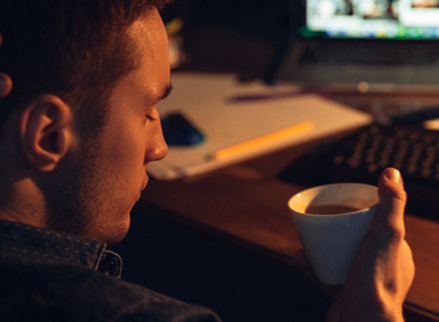overwhelmed at work? Six expert strategies to help
Feeling overwhelmed at work can take a toll on your mental health and well-being. If mounting responsibilities and stress are weighing you down, you're not alone. Here's what you can do...
View moreIs preparing for your ACA exams getting in the way of your sleep schedule? Take a look at how getting better rest might improve your study habits.
Rate this content
You’ve probably heard of – or are maybe even guilty of yourself – staying up to the early hours of the morning fuelled by coffee or energy drinks to squeeze as much studying into the day as possible.
You may not be surprised that this is not a productive study technique. But how important is sleep to your exam prep exactly?

As well as benefits to your mental health, regulated sleep can help with improving your immune system and lowering the risk of chronic illnesses.
So, you understand why you need a good night’s sleep, but getting the right amount of shut eye isn’t always easy. Here are a few tips for improving your sleeping routine:
Our bodies thrive on routine. Go to bed and wake up at the same time each day, even on weekends. This helps regulate your body's natural sleep-wake cycle for easier falling asleep and waking up feeling refreshed.
Wind down before bed with calming activities like reading a book, taking a warm bath, or practicing light stretches. Avoid stimulating activities like watching TV or using electronic devices for at least an hour before bed. The blue light emitted can disrupt melatonin production, a hormone that signals sleepiness.
Make your bedroom a sleep haven. Keep it cool, dark, and quiet. Invest in blackout curtains, earplugs, and a comfortable mattress and pillows. Remove distractions like electronics from the bedroom to encourage relaxation and sleep. Avoid using your bedroom for activities like studying. This can trick your brain into associating your bedroom with wakefulness, making it harder to fall asleep and achieve restful sleep.

Disconnecting from technology can be a challenge. However, the blue light emitted from electronic devices can disrupt sleep patterns. Turn off screens like TVs, laptops, and phones at least an hour before bed. Consider using blue light filters on your devices or setting them to night mode in the evening.
Sometimes there’s something going on beneath the surface. If you’re still struggling to sleep after making changes to your routine, it might be due to mental health issues like anxiety, or conditions such as insomnia.
You can access free mental health support through our partnership with Qwell. Alternatively, contact us and we’ll help you get the support you need.

We offer an expert-led and interactive training session to help you ace your exams, maintain balance and stay focused. Learn how to priortise tasks and develop effective management techniques. Want to say goodbye to procrastination and keep burnout at bay? Sign up for free today.
29 August 2024 6.30pm – 7.30pm

Feeling overwhelmed at work can take a toll on your mental health and well-being. If mounting responsibilities and stress are weighing you down, you're not alone. Here's what you can do...
View more
Failing an exam can leave you feeling deflated and embarrassed. Discover our 6 top tips for picking yourself back up after failing an accounting exam.
View more
Discover the expert tips to building a study routine timetable tailored to your learning style.
View more
Worried about ACA exams? Finding yourself procrastinating? Try these five simple tips to help you find your study state.
View more
If you've failed an accounting exam and aren't sure how to tell those around you, our top tips will help you to manage these difficult conversations.
View more
Do you keep putting off your revision for another day? That’ll be procrastination getting the better of you! Here's how to tackle exam revision procrastination head on.
View more
Being ‘in the zone’ or feeling your flow can help you revise for exams more easily. Discover what a flow state of mind is, the benefits and how you can find yours.
View more
Exams can be an overwhelming experience, but with the right strategies, you can overcome anxiety and perform at your best. Discover practical tips to manage exam stress...
View more
Facing academic pressure or struggling to adapt to changing circumstances? We’re here to support you throughout your professional journey.
View more
Is exam stress getting the better of you? Putting on your running shoes might help more than you may think.
View more
Is preparing for your ACA exams getting in the way of your sleep schedule? Take a look at how getting better rest might improve your study habits.
View more
If you are neurodivergent and need adjustments in your ACA exams, read on to find out what you may be entitled to.
View more
Jas Rayat, recent ACA graduate, talks you through her process and how she managed to cope with exam stress and work-life balance.
View more
Taking the ACA exams is no doubt nerve-racking, but being able to prepare a bit more for the day can massively help stress levels. We've broken down a few things you should know!
View moreIf you need financial support, we carry out a means test where we consider income, expenditure, capital and assets.
*Please note none of our other services are means-tested.
The journey through your ACAs is challenging and demanding. But for neurodivergent students, this path can present even more obstacles during this stressful period of your life.
Depending on your neurodivergent circumstances, you may be entitled to support both in the workplace and beyond from us at caba.
This could be through aiding your ICAEW access arrangements, Access To Work applications, help related benefits and financial support for assistive technologies.
We can also support if you’re looking for a diagnosis of, or need an up-to-date assessment for, dyslexia, dyspraxia and ADHD. We can also give guidance around Autism Spectrum Disorders (ASD) or those whom have a diagnosis and wish to access further support.
Talk to our team today to find out more.
Financial difficulties can impact anyone and it often manifests through stress, anxiety and uncertainty about the future. It may also affect our personal relationships, mental wellbeing and overall quality of life.
Here’s how we can help, whether you live in the UK or anywhere internationally. We offer a wide range of financial support to help you get on track of your finances. As we’re independent to the ICAEW, your case will be handled with absolute confidentiality.
Our financial support can help those on low income with one-off costs such as ICAEW membership and admission fees, essential household items or maintenance, back to school payments and energy cost donations.
We have specialist debt advisors on hand to help you identify the best options for getting on top of your debt.
We’ll work with you to understand your situation and any statutory benefits or local grants you may be entitled to.
Whatever your worries, big or small, know you’re not alone. Contact us today and we can talk through your situation.
Also catch our latest financial podcasts ‘the cash conversation’ that explores topics such as debt, budgeting and savings.